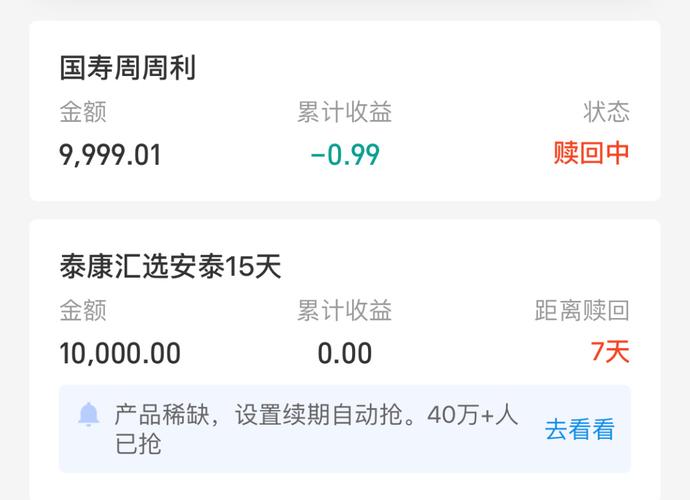基金时间点
Understanding Fund Renewal Periods

Fund renewal periods, also known as fund renewal time or fund renewal cycles, refer to the time frame during which investors can choose to extend their investment in a particular fund. This concept is commonly encountered in the realm of mutual funds, exchangetraded funds (ETFs), and other investment vehicles. Let's delve deeper into what fund renewal periods entail and what they mean for investors.
Fund Renewal Period Explained
When investors put their money into a mutual fund or an ETF, they are essentially buying shares of a pool of securities managed by a professional investment team. These funds often come with an expiration date or a fixed term, after which investors need to decide whether to renew their investment or withdraw their funds.
Significance of Fund Renewal Periods
1.
Investor Choice
: Fund renewal periods offer investors the opportunity to reassess their investment strategy and decide whether to continue their investment in the fund or explore other options.2.
Portfolio Management
: For fund managers, renewal periods provide a chance to rebalance the fund's portfolio, adjust investment strategies, or introduce changes based on market conditions and investor preferences.3.
Risk Management
: Renewal periods allow investors to review the fund's performance and assess any changes in risk factors, ensuring alignment with their risk tolerance and investment objectives.4.
Liquidity Management
: Fund renewal cycles help fund managers anticipate potential fund inflows or outflows, allowing them to manage liquidity effectively and maintain the fund's stability.Guidance for Investors
1.
Review Fund Performance
: Before deciding whether to renew your investment, carefully evaluate the fund's performance over the previous term. Consider factors such as returns, volatility, and consistency relative to the fund's objectives and benchmark.2.
Assess Fees and Expenses
: Take into account the fund's fees and expenses, including management fees, administrative costs, and any applicable loads. Ensure that these costs are reasonable and justified by the fund's performance and services provided.3.
Consider Market Conditions
: Assess prevailing market conditions and economic outlook to gauge potential risks and opportunities associated with renewing your investment in the fund. Seek professional advice if needed to understand the broader market context.4.
Evaluate Investment Objectives
: Revisit your investment objectives, time horizon, and risk tolerance to determine whether the fund remains aligned with your financial goals. Consider any changes in your circumstances that may warrant adjustments to your investment strategy.5.
Explore Alternatives
: Use the fund renewal period as an opportunity to explore alternative investment options that may better suit your objectives and preferences. Compare different funds based on performance, fees, investment approach, and other relevant factors.Conclusion
Fund renewal periods play a crucial role in the investment process, allowing investors to reassess their investment decisions, manage risks, and optimize their portfolios. By understanding the significance of fund renewal cycles and following prudent guidance, investors can make informed choices that align with their financial goals and risk preferences.
股市动态
MORE>- 搜索
- 最近发表
-
- 成都金宇集团,西南经济的璀璨明珠成都
- 探索和讯黄金网,黄金投资的数字化时代
- 雷亚尔对人民币汇率,理解货币兑换的艺术
- 长江电力股份,能源巨轮,照亮未来
- 探索福州市房产交易中心,房产交易的桥梁与指南
- 深入解析基金000001,投资小白的入门指南
- 高盟新材股票,分析、前景与投资建议
- 亚夏汽车股票,投资潜力与市场前景分析
- 深入解析,保险代理人资格证的重要性与获取路径
- 海王英特龙,探索深海的神秘生物
- 保护您的数字资产,了解和使用交易密码的重要性
- 中国平安常青树,稳健投资的典范
- 天安保险股份有限公司,引领行业的创新与服务
- 股票600015,投资界的宝藏还是陷阱?
- 邮票交易所,收藏爱好者的天堂
- 河池化工,化工行业的璀璨明珠
- 江苏银行理财产品,投资智慧与财富增长的桥梁
- 三一重工的全球扩张,收购战略如何塑造未来
- 探索保单查询的奥秘,为何它对你的财务健康至关重要
- 充电桩概念股,新能源时代的投资机遇与挑战





